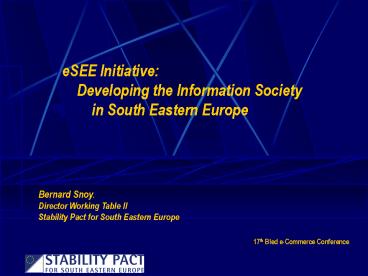17th Bled eCommerce Conference - PowerPoint PPT Presentation
1 / 13
Title:
17th Bled eCommerce Conference
Description:
17th Bled e-Commerce Conference. Bernard Snoy. Director Working Table II ... Bulgaria and Romania have subsequently become part of the eEurope process. 4 ... – PowerPoint PPT presentation
Number of Views:21
Avg rating:3.0/5.0
Title: 17th Bled eCommerce Conference
1
eSEE Initiative Developing the Information
Society in South Eastern Europe
Bernard Snoy. Director Working Table II Stability
Pact for South Eastern Europe
- 17th Bled e-Commerce Conference
2
What is the eSEE Initiative?
eSEE, the electronic South Eastern Europe
Initiative was launched in 2000 under the
auspices of the Stability Pact for South Eastern
Europe with the following objectives
- To support the development of the Information
Society in South Eastern Europe - To focus on strategies and measures which promote
the region as a whole - To promote benchmarking, best practice and
co-operation within the region - To facilitate projects in e-Governance,
e-Business, e-Education and e-Health
3
eSEE Initiative Participants
- Albania
- Bosnia Herzegovina
- Bulgaria
- Croatia
- Macedonia
- Moldova
- Romania
- Serbia and Montenegro
- UNMIK (acting on the basis of UN Resolution
1244)
Bulgaria and Romania have subsequently become
part of the eEurope process
4
eSEE Initiative Supporters
- Austria, Greece, Hungary, Slovenia, Sweden, UK
and US (Commercial Law Development Programme) - European Commission (DG Enterprise and
Information Society) - World Bank, EBRD
- UNDP, UNECE
- INA/SEETA (Greece)
5
Importance for the Region
- ICT as development and catching-up factor
- Realisation that the application of digital
technology has become a key factor for economic
growth and employment creation - Synergy between the transition process and the
process of transforming the economic systems of
the SEEurope countries into societies based on
information technologies
6
Results
- Joint Ministerial Statement of Intent
(Ljubljana, June 2002) - Ministerial Regional Conference on
Telecommunication Policy(Belgrade, October 2002) - Adoption of eSEEurope Agenda for the Development
of the Information Society(Belgrade, October
2002)
7
eSEE Agenda
- Signatories
- Albania, Bosnia and Herzegovina, Croatia, FR
Yugoslavia (Serbia and Montenegro), Macedonia and
Moldova - Commitments
- Adoption of national polices and strategies for
IS - Adoption and implementation of Acquis
Communautaire - Establishment of regional and national
implementation mechanisms - Promotion of active IS for development.
8
Liberalisation of Electronic Communications
- Adoption of Acquis Communautaire includes
liberalisation of electronic communications - Liberalisation and legal certainty are key
preconditions for attracting foreign investment
in SEEurope and obtaining full benefits of ICT.
9
eSEE Working Group Results
- Meetings in 2003 Skopje (February), Athens
(May), Bled (June), Tirana (September), Brussels
(December) - Common Guidelines for National Information
Society Policies - Unified Terms of Reference for Information
Society State Bodies - Participation to Conference on Data Protection
and Security (Belgrade 2003) and WSIS (Geneva
2003) - Benchmarking activities.
10
eSEE Working Group Results (continued)
- Participation to European Ministerial Conference
on Information Society (EMCIS), Budapest, 26-27
February 2004 - Joint Statement of the e-SEE Ministers
- Presentation on behalf of all of them by
Croatian Minister of Science, Education and
Sports - Support in Conference Conclusions
- Meetings in 2004 Podgorica (April)
- Cavtat (June)
- E-Governance Training, Talinn, May-June
11
eSEE Joint Statement to the EMCIS Conference
- Reiterating commitment to
- Develop an inclusive Information Society
- Apply the same norms and standards as practiced
in the EU, including the new EU framework for
electronic communications networks - Implement eSEE Agenda
- Joint Appeal for
- More support from EU countries in learning from
best practices and lessons learned, especially
from the accession and candidate countries - A closer association of the eSEE Initiative with
the eEurope 2005 Action Plan.
12
Priorities until end of 2004(after the eSEE
Joint Statement)
- To further promote and implement the adopted
Guidelines for the NISP and the ToR for
Information Society State Bodies - To benchmark and monitor the effective
implementation of the commitments - To strengthen dialogue between the signatories
and supporting countries and organisations - To facilitate and coordinate technical assistance
and joint efforts
13
Matrix on status of fulfillment of eSEE Agenda
serves as
- An international benchmarking for the eSEE
Working Group - A platform for the signatories to share the
update on the progress made in their respective
countries - For more information please see the Stability
Pact web site http//www.stabilitypact.org/e-see/d
efault.asp - Basic documents

